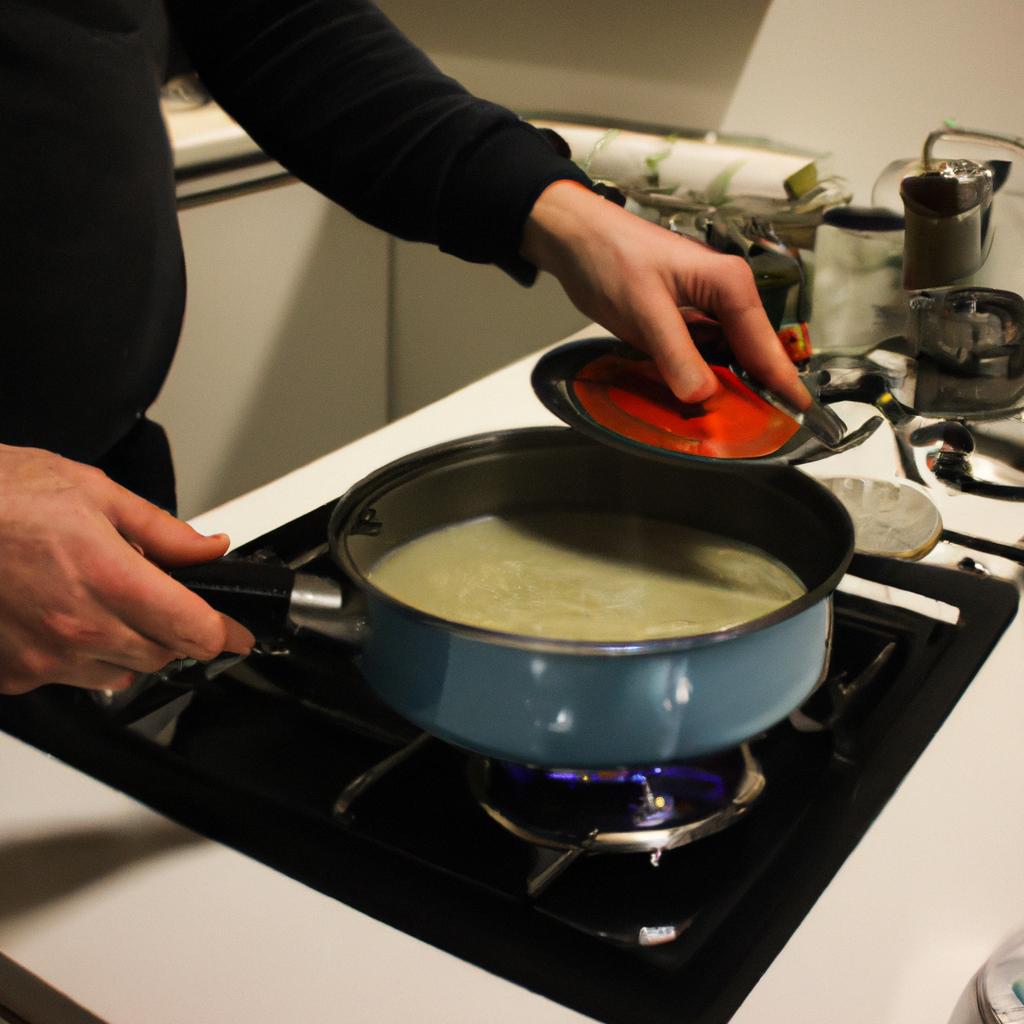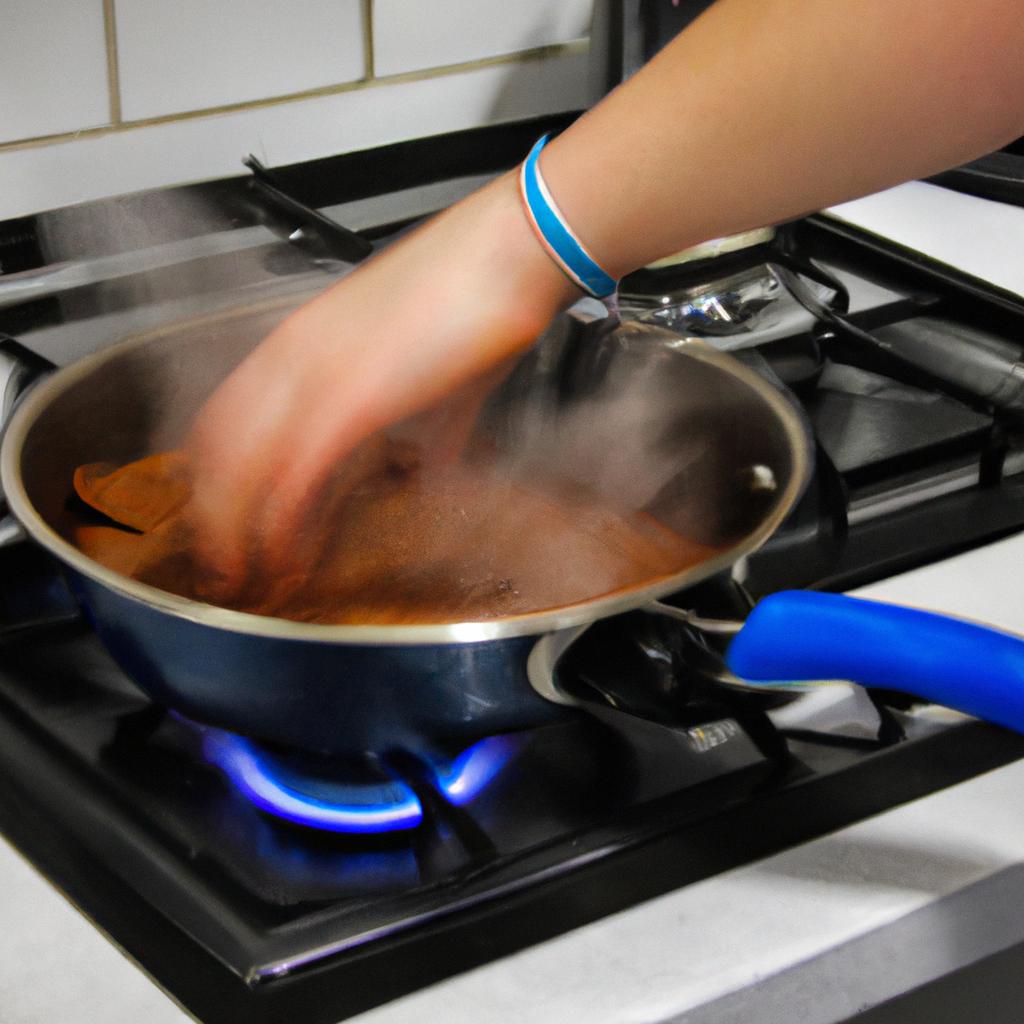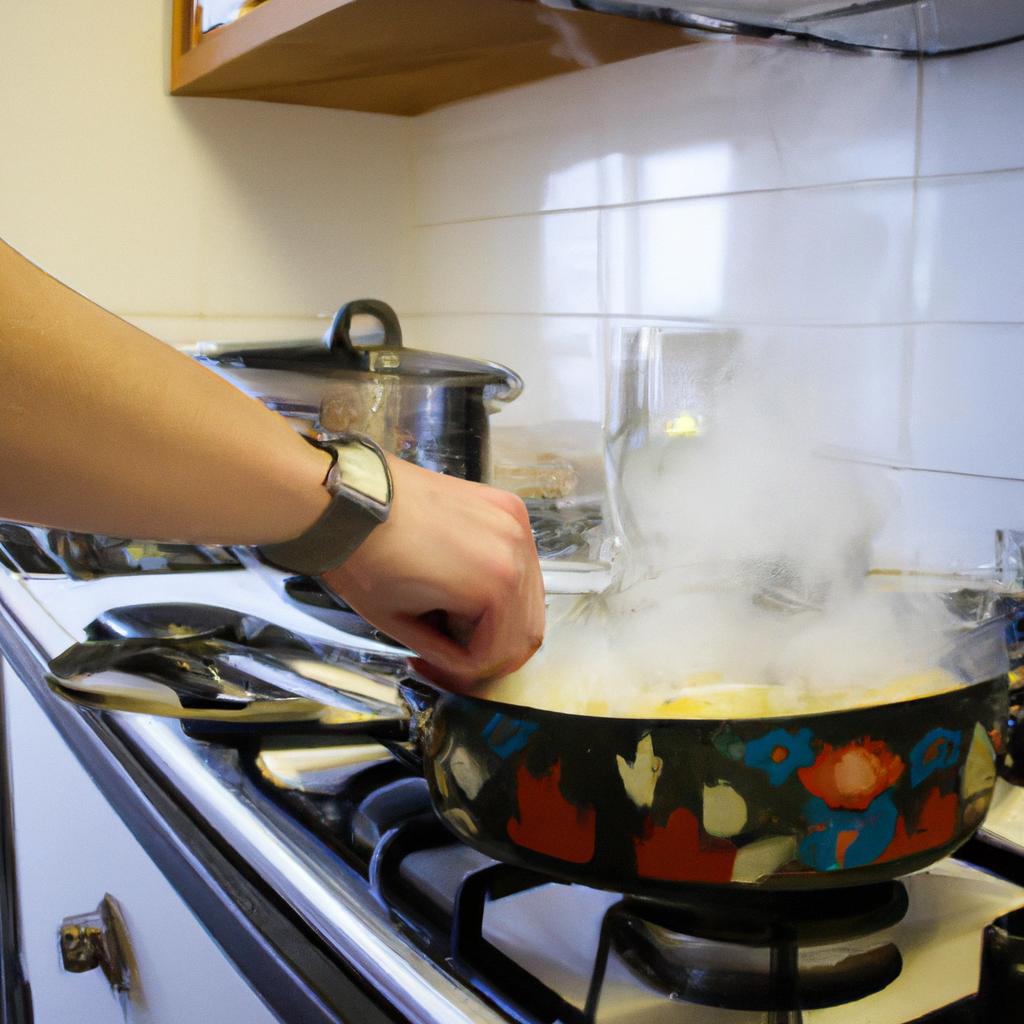Culinary scholarships are a valuable source of funding that can help aspiring chefs and culinary enthusiasts pursue their passion for recreation and food. In today’s highly competitive world, where the cost of education continues to rise, these scholarships provide an opportunity for individuals with limited financial resources to access quality training in the culinary arts. For instance, consider the case of Sarah, a talented young chef who dreams of attending a renowned culinary institute but lacks the means to afford tuition fees. Through a culinary scholarship, she is able to overcome this obstacle and embark on her journey towards becoming a professional chef.
Acquiring knowledge and skills in the field of gastronomy requires not only dedication but also financial investment. Culinary scholarships serve as a lifeline for those who may otherwise be unable to experience formal education or advanced training in the culinary arts due to monetary constraints. These scholarships enable students like Sarah to attend prestigious institutions, gain hands-on experience through internships, participate in workshops led by industry experts, and explore various aspects of cuisine from around the globe.
By supporting deserving individuals pursuing careers in the culinary industry, these scholarships contribute not only to personal growth but also to elevating the standards of gastronomy as a whole. Moreover, they foster diversity within this realm by providing opportunities to individuals from different backgrounds and cultures who may not have had access to formal culinary training otherwise. This diversity brings a fresh perspective and innovative ideas to the industry, enriching the culinary landscape with unique flavors, techniques, and traditions.
Culinary scholarships also help address the shortage of skilled chefs in the industry by encouraging talented individuals to pursue a career in the culinary arts. By providing financial support, these scholarships attract passionate individuals who may have been deterred by the high cost of education. As a result, more aspiring chefs are able to receive quality training and develop their skills to meet the demands of an ever-evolving gastronomic landscape.
Additionally, culinary scholarships create a ripple effect within local communities. When recipients of these scholarships complete their education and enter the workforce, they become valuable contributors to their communities by creating employment opportunities, supporting local businesses, and sharing their knowledge with others. Their success inspires future generations to pursue careers in the culinary arts, ensuring a continuous stream of talent and innovation in this field.
In conclusion, culinary scholarships play a vital role in making education and training in the culinary arts accessible to individuals from all walks of life. Not only do they provide financial assistance, but they also foster diversity, elevate standards in gastronomy, address skill shortages, and contribute positively to local communities. These scholarships empower aspiring chefs like Sarah to pursue their dreams without being hindered by financial constraints while simultaneously benefiting society as a whole through their contributions to the world of food and hospitality.
Types of culinary scholarships
Types of Culinary Scholarships
One example of a culinary scholarship is the James Beard Foundation Scholarship. This prestigious award is given to aspiring chefs who have demonstrated exceptional talent and commitment to pursuing a career in the culinary arts. The recipient receives financial support to attend a reputable culinary school, allowing them to further develop their skills and knowledge in the field.
There are several types of scholarships available for students interested in culinary education. These scholarships can be broadly categorized into the following:
-
Merit-based scholarships: These scholarships are awarded based on academic achievement, leadership qualities, and extracurricular involvement. Students with outstanding academic records and a strong passion for cooking may be eligible for these scholarships.
-
Need-based scholarships: Designed to assist students from low-income backgrounds, need-based scholarships consider an applicant’s financial situation when determining eligibility. These scholarships aim to provide equal opportunities for those who may not otherwise afford culinary education.
-
Industry-specific scholarships: Some organizations within the food industry offer specialized scholarships aimed at supporting individuals pursuing specific careers or subfields within the culinary world. For instance, there may be scholarships specifically tailored for pastry chefs or sommeliers.
-
Diversity-focused scholarships: In an effort to promote diversity and inclusion within the culinary industry, certain scholarships target underrepresented groups such as women, minorities, or individuals from disadvantaged communities. These initiatives aim to create more equitable opportunities for all aspiring chefs.
Emotional bullet point list
- Fulfill your culinary dreams through financial assistance.
- Gain recognition and validation for your talents.
- Join a community of passionate individuals dedicated to culinary excellence.
- Open doors to exciting career opportunities in various sectors of the food industry.
| Types of Culinary Scholarships | |
|---|---|
| 1 | Merit-based |
| 2 | Need-based |
| 3 | Industry-specific |
| 4 | Diversity-focused |
Aspiring chefs and culinary enthusiasts can explore these various types of scholarships to find the one that aligns with their goals, aspirations, and unique circumstances. By understanding the different opportunities available, individuals can make informed decisions about pursuing financial assistance for their culinary education.
Transitioning into the subsequent section on “Eligibility criteria for culinary scholarships,” it is crucial to consider how these diverse scholarship programs have specific requirements in order to qualify for funding. These eligibility criteria will be explored in further detail in the following section.
Eligibility criteria for culinary scholarships
One example of a funding source for culinary scholarships is the James Beard Foundation. Established in 1986, this renowned organization provides financial support to aspiring chefs and culinary professionals who demonstrate exceptional talent and dedication in their field. Through their scholarship program, the James Beard Foundation aims to promote diversity and excellence within the culinary industry.
When exploring funding opportunities for culinary scholarships, it is important to consider various sources that can provide financial assistance. Here are some options to explore:
-
Government Grants and Scholarships: Many governments offer grants and scholarships specifically designed to support individuals pursuing careers in the culinary arts. These programs often have specific eligibility criteria and application processes, so it is essential to research and understand these requirements before applying.
-
Non-Profit Organizations: Numerous non-profit organizations focus on empowering aspiring chefs by providing them with financial aid. These organizations may have different focuses or target specific demographics such as women or underrepresented communities. Researching these non-profits can help identify potential funding opportunities.
-
Industry Associations: Professional associations related to the culinary field often offer scholarships or grants to students or professionals seeking further education or career advancement. These associations aim to support individuals who show promise in contributing positively to the industry’s growth and development.
-
Corporate Sponsorship Programs: Some food-related companies have sponsorship programs dedicated to supporting talented individuals pursuing careers in the culinary arts. These programs may include internships, mentorship opportunities, networking events, and financial assistance.
Consider this table showcasing various funding sources for culinary scholarships:
| Funding Source | Description |
|---|---|
| James Beard Foundation | Provides financial support through its scholarship program |
| Government Grants | Available through government initiatives for aspiring chefs |
| Non-Profit Organizations | Focus on empowering aspiring chefs from diverse backgrounds |
| Industry Associations | Offer scholarships or grants for further education |
Exploring these funding sources can open doors to financial support and opportunities for aspiring culinary professionals. By leveraging these resources, individuals can alleviate some of the financial burdens associated with pursuing their passion for food.
Transitioning into the subsequent section about “How to find and apply for culinary scholarships,” it is crucial to navigate through various scholarship programs effectively. Understanding the application process and requirements will maximize your chances of securing funding for your culinary education or career advancement.
How to find and apply for culinary scholarships
Eligibility criteria for culinary scholarships are the key factors that determine whether or not a student is eligible to apply for and receive financial assistance. These criteria vary from scholarship to scholarship, but generally include a combination of academic achievement, demonstrated passion for culinary arts, and financial need. For example, let’s consider the case of Maria, a talented aspiring chef who is passionate about pursuing her education in culinary arts.
To be eligible for most culinary scholarships, applicants must meet certain requirements. Some common eligibility criteria include:
-
Academic Excellence: Many scholarships require students to have a minimum GPA (Grade Point Average). This ensures that recipients are dedicated to their studies and can excel academically while pursuing their culinary education.
-
Culinary Experience: Scholarships often prioritize candidates with prior experience or involvement in the culinary field. This may include participation in cooking competitions, internships at restaurants or hotels, or relevant volunteer work.
-
Financial Need: Some scholarships prioritize assisting students who come from low-income backgrounds or families with limited financial resources. Demonstrating financial need through documentation such as income statements or tax returns may be necessary to qualify for these types of scholarships.
-
Community Involvement: Scholarships sometimes value community service and give preference to candidates who actively contribute to their communities through volunteering or leadership roles.
It is important to note that each scholarship has its own specific eligibility requirements and selection process; therefore, it is crucial for prospective applicants to carefully review all guidelines before applying.
In addition to understanding the eligibility criteria, it can be helpful to explore various funding opportunities available specifically within the realm of culinary arts. Here is an overview of some popular culinary scholarships:
| Scholarship Name | Eligibility Criteria | Award Amount |
|---|---|---|
| James Beard Foundation | Outstanding talent in the world of food | $20,000 – $40,000 |
| National Restaurant Assoc | Pursuing a culinary or hospitality-related degree | $2,500 |
| Culinary Institute of Amer | Demonstrated passion for the culinary arts | Varies |
| Les Dames d’Escoffier | Female students pursuing careers in food and beverage | Varies |
These scholarships represent just a few examples among many available funding opportunities. Researching and exploring additional options can significantly increase the chances of securing financial aid to support one’s culinary education.
Transitioning into the next section about “Tips for writing a winning scholarship essay,” it is important to note that while eligibility criteria are crucial, they alone cannot guarantee success in obtaining a scholarship. The application process often requires candidates to submit supporting documents, such as recommendation letters or personal essays, which provide insight into their aspirations, experiences, and motivations. Crafting a compelling scholarship essay is essential to stand out from other applicants and leave a lasting impression on the selection committee. By following these tips and strategies, aspiring culinary scholars can enhance their chances of receiving the financial assistance they need to pursue their dreams.
Tips for writing a winning scholarship essay
Section Title: Funding Opportunities for Culinary Students
Having learned about the process of finding and applying for culinary scholarships, it is now essential to explore the various funding opportunities available to aspiring chefs. These opportunities can greatly alleviate financial burdens and provide support throughout their educational journey.
Paragraph 1: One notable example of a funding opportunity in the field of culinary arts is the James Beard Foundation Scholarship Program. This renowned program aims to assist talented individuals pursuing careers in food-related fields by offering financial aid, mentorship, and networking opportunities. By highlighting case studies of successful recipients who have benefited from this program, such as Chef Sarah Johnson, whose scholarship allowed her to attend one of the top culinary schools in the country, we can understand how impactful these scholarships can be.
- Scholarships play a vital role in empowering students to pursue their passion without burdening themselves with excessive student loans.
- They provide access to high-quality education that might otherwise be financially unattainable.
- Scholarships foster an inclusive environment where talent and dedication are recognized rather than hindered by economic constraints.
- Financial assistance through scholarships enables students to focus on honing their skills and knowledge instead of worrying about tuition fees.
| Scholarships | Eligibility Requirements | Application Deadlines | Award Amounts |
|---|---|---|---|
| James Beard Foundation Scholarship Program | Aspiring culinarians with exceptional talent and motivation; specific requirements vary based on individual awards | Varies depending on scholarship category | Ranges from $2,000 – $20,000 |
Paragraph 2: Apart from the James Beard Foundation Scholarship Program, there are numerous other organizations providing financial aid options for culinary students. Here are some additional resources worth exploring:
- The American Culinary Federation Educational Foundation offers multiple scholarships designed specifically for culinary students at different stages of their education.
- Local community foundations often have scholarship programs tailored towards supporting local talent within the culinary arts.
- Professional associations, such as the National Restaurant Association Educational Foundation and Women Chefs & Restaurateurs, offer scholarships to encourage diversity and inclusivity in the industry.
Paragraph 3: These funding opportunities not only provide financial support but also open doors to networking events, internships, and mentorship programs. As aspiring chefs pursue their education with the assistance of these scholarships, they are better prepared to enter a competitive industry with confidence and expertise.
While culinary scholarships are an excellent avenue for financial aid, it is essential to explore other options available to students pursuing careers in the culinary arts.
Other financial aid options for culinary students
Culinary Scholarships: Funding Opportunities for Recreation and Food
Tips for writing a winning scholarship essay have provided valuable insights into crafting an exceptional application. Now, let’s explore other financial aid options available for culinary students. With the rising costs of education, scholarships play a crucial role in making culinary dreams come true.
One inspiring example is Sarah Thompson, a passionate aspiring chef from a low-income background. Despite facing financial constraints, Sarah was determined to pursue her culinary education. She discovered various scholarships specifically designed for culinary students, which ultimately enabled her to enroll in a prestigious culinary arts program. Sarah’s story exemplifies how scholarships can be instrumental in transforming aspirations into reality.
To further assist prospective culinary scholars like Sarah, here are some additional funding opportunities:
- Culinary Institute Grants: These grants are offered by renowned culinary institutes and provide financial assistance based on merit or need.
- Industry-Specific Scholarships: Several organizations within the food industry offer scholarships targeted at individuals pursuing careers related to specific areas such as baking, nutrition, or hospitality management.
- Local Community Foundations: Many community foundations offer scholarships designated for residents pursuing vocational training programs or higher education in fields like culinary arts.
- Corporate Sponsorship Programs: Various companies sponsor scholarships for aspiring chefs as part of their corporate social responsibility initiatives.
These funding options open doors to countless possibilities and make it more accessible for individuals with talent and passion to enter the realm of professional cooking. To illustrate the variety of these opportunities, consider the following table showcasing different types of scholarships available to culinary students:
| Scholarship Type | Eligibility Criteria | Application Deadline | Award Amount |
|---|---|---|---|
| Culinary Institute Grants | Merit-based | Varies | $5,000 – $20,000 |
| Baking Enthusiast Scholarships | Passion for baking | May 31st | Up to $2,500 |
| Nutrition Excellence Scholarship | Academic achievement in nutrition | July 15th | $3,000 |
| Local Community Foundation Scholarships | Residency in specific region | Varies | Up to $10,000 |
These scholarships not only alleviate financial burdens but also provide a sense of validation and encouragement. They enable individuals to focus on honing their skills and pursuing excellence without worrying about the cost of education.
In exploring different funding opportunities for culinary students, we have seen how scholarships can transform lives. Let’s be inspired by their journeys towards culinary greatness.
Success stories of culinary scholarship recipients
Building on the discussion of various financial aid options for culinary students, this section highlights success stories of individuals who have benefitted from culinary scholarships. These real-life examples serve as inspirations and demonstrate how scholarship opportunities can significantly impact a student’s educational journey in the field of culinary arts.
Example Case Study:
One notable success story is Anna Johnson, a passionate aspiring chef who dreamt of pursuing her culinary education but faced financial constraints. Through diligent research and persistence, Anna discovered the James Beard Foundation Scholarship program, which provided her with the necessary funding to attend a prestigious culinary school. With this support, she excelled academically and gained valuable hands-on experience during internships at acclaimed restaurants. Today, Anna has become an accomplished chef and attributes her success to the opportunity afforded by the scholarship.
The Impact of Culinary Scholarships:
Culinary scholarships offer numerous benefits that extend beyond financial assistance. Consider these points:
- Accessible Education: Scholarships make quality culinary education accessible to talented individuals who may otherwise struggle to afford tuition fees.
- Professional Development Opportunities: Many scholarships provide recipients with internship placements or mentorship programs, offering invaluable industry connections and guidance.
- Enhanced Skill Development: Financial stability allows students to fully immerse themselves in their studies without worrying about part-time jobs or other distractions.
- Confidence Boost: The recognition bestowed upon scholarship recipients boosts their self-esteem and motivates them to excel academically and professionally.
Table – Successful Culinary Scholarships:
| Scholarship Program | Criteria | Amount Awarded |
|---|---|---|
| James Beard Foundation | Demonstrated passion | $20,000 |
| for culinary arts | ||
| National Association | Academic excellence | Varies |
| of Catering Executives | and financial need | |
| Culinary Institute of | Outstanding culinary | Full tuition, |
| America Scholarships | skills | stipend |
These examples highlight the transformative power of culinary scholarships in enabling students to pursue their dreams while alleviating financial burdens. By providing opportunities for education, professional development, skill enhancement, and a confidence boost, these scholarships play a pivotal role in shaping successful careers in the culinary industry.
In summary, success stories like Anna Johnson’s exemplify how culinary scholarships can change lives by opening doors that might otherwise remain closed due to financial constraints. Through accessible education, professional connections, enhanced skill development, and increased self-confidence, scholarship recipients are empowered to succeed in their chosen field. As we delve further into the world of culinary scholarships, it becomes increasingly evident that they offer not only monetary support but also invaluable resources for personal growth and career advancement.
 Refoksa
Refoksa



